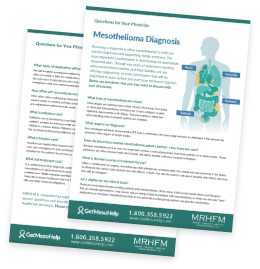Standard Mesothelioma Treatment Options
Treating mesothelioma continues to improve every year and patients are living longer as a result. Patients may turn to traditional therapies, like chemotherapy and radiation, as well as clinical trials, which may lead to a cure in the future. Knowing that not all mesothelioma patients are the same, some are good candidates for surgery while others may respond better to other treatments.
Simply put, there is not a dedicated treatment plan that accommodates all mesothelioma patients. There are some standard and alternative treatments that may work alone, or in combination, to help treat mesothelioma. Researchers are creating, testing, and refining new mesothelioma treatments every day, giving patients hope to improve their prognosis. If you’ve been diagnosed with mesothelioma, get help finding treatments that are right for you.
- Chemotherapy - refers to a drug, or combination of drugs, that kills, shrinks, slows down or damages cancer cells in the body.
- Immunotherapy - activates the immune system to target and kill mesothelioma cells, which may also help mesothelioma patients who are not responding to traditional methods like chemotherapy.
- Surgery - as the oldest option for treating cancer, surgery is the best way to remove large portions of affected tissue and is usually most effective in the early stages of mesothelioma when the cancer has not spread too far.
- Radiation - as a noninvasive treatment, radiation uses special machines to generate and direct high-energy X-ray particles to specific places in the body.
- Multimodal - a combination of several of the above mentioned treatments with the intent to extend survival time, like combining surgery and chemotherapy for example.
Alternative Mesothelioma Treatment Options
Depending on the patient’s type of mesothelioma, stage, and other factors, newer approved treatments may be used in addition to traditional therapies such as surgery, standard chemotherapy, and radiation. Researchers are studying how to imitate or stimulate the immune system's natural response to cancer, like mesothelioma. There may be ways to assist your own immune system in fighting cancer without interfering with chemotherapy, radiation or other traditional forms of treatment. Such methods include:
- Intensity-Modulated Radiation Therapy (IMRT) - a type of 3D radiation therapy that uses a computer to make pictures of the size and shape of the tumor. Thin beams of radiation of different intensities (strengths) are aimed at the tumor from many angles. This type of radiation therapy causes less damage to healthy tissue near the tumor, and it reduces treatment toxicity, leading to fewer side effects.
- Proton Therapy - an established radiation therapy that uses proton beams instead of photons or electrons. Protons are parts of atoms that cause little damage to tissue they pass through but are very good at killing cells at the end of their path. This means that proton beam radiation may be able to deliver more radiation to the tumor while reducing side effects on normal tissues. Protons can only be put out by a special machine called a cyclotron or synchrotron.
- Photon Therapy - traditionally known as external beam radiation therapy, photon beams are used to get to the tumor but also can damage healthy tissue around the tumor. Photons are used in treatments that are given by a machine called a linear accelerator.
- Photodynamic Therapy - a treatment that uses a drug called a photosensitizer or photosensitizing agent and a particular type of light. When photosensitizers are exposed to a specific wavelength of light, they produce a form of oxygen that kills nearby cells.
Get Free Mesothelioma Resources & Support
Our advocate team is dedicated to helping you and your loved ones understand what mesothelioma is, what treatment options may be best for your specific situation, and what additional resources you may need. We feel strongly that anyone diagnosed with mesothelioma needs an advocate.
Complete the form below to start the conversation and receive your free mesothelioma resources.

